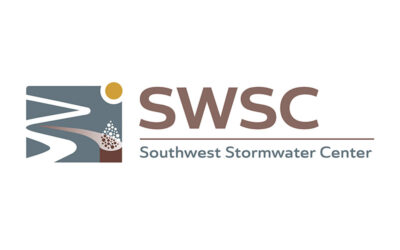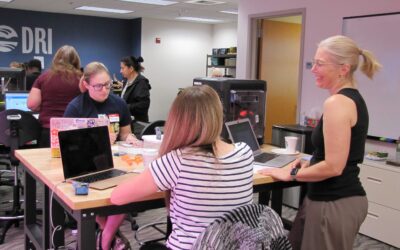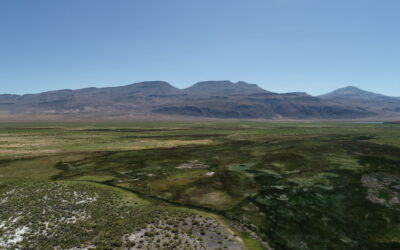Community volunteers needed to help scientists map the hottest areas of Washoe County on July 27th
Reno, Nev. (July 2, 2024) – Scientists from the Desert Research Institute (DRI) and the University of Nevada, Reno are recruiting volunteers to conduct a one-day campaign to map extreme heat across Washoe County.

On July 27th, community volunteers will fan out across the county to collect thousands of temperature and humidity measurements from early morning through evening, taken over 3 one-hour periods. The project will distribute sensors at a central meeting location, which volunteers will attach to their vehicles before driving along predetermined routes. Volunteers can serve as drivers or navigators.
The project aims to increase understanding of how the urban heat island effect – the tendency for urban environments to concentrate and amplify heat – impacts communities throughout the county. The information will then be used by city planners and community groups to plan for street trees, shade structures, and other resources. A recent study by Climate Central found that climate change and urban development have made Reno the fastest warming city in the nation. The city’s annual average temperature has increased by 7.6°F since 1970, more than double the national average temperature increase of 2.6°F.
“This campaign will illuminate the considerable variability in surface temperatures across the Reno-Sparks area,” said John Mejia, assistant research professor of climatology at DRI and research team member. “The information we collect will facilitate our research assessing how much cooling climate mitigation strategies, such as urban trees and reflective roofing, can provide.”
The team is placing strong emphasis on using this campaign to support disadvantaged communities, particularly in heavily urbanized lower elevation areas of the community where temperatures are often the highest and air quality is the worst. Interested volunteers can visit the project’s webpage for more information and fill out the Volunteer Interest Form: https://forms.gle/QA2FtCeHwHJoSix9A.
Resources are available in both English and Spanish, and Spanish-speakers will be available the day of the event to help coordinate with Spanish-speaking community members. Volunteers will be expected to complete a short training session (available in person or online), complete a knowledge quiz, and sign a liability waiver. Drivers will need a valid driver’s license, auto insurance, and access to a vehicle.
The project is organized by a broad community coalition, including scientists from the Nevada State Climate Office at the University of Nevada, Reno, The Desert Research Institute (DRI), The City of Reno, The City of Sparks, Washoe County, the Reno-Sparks Indian Colony, RTC-Washoe, the Reno-Sparks Chapter of Citizens’ Climate Lobby, Faith in Action Nevada, Make the Road Nevada, and the Truckee Meadows Regional Planning Agency.
“With Washoe County residents bearing the brunt of rising heat, air pollution and the health impacts that result from these, it’s important to know how and where we can take action to reverse these trends,” said Brian Beffort, Sustainability Manager for Washoe County. “This heat mapping exercise gives our community’s jurisdictions and partner agencies and organizations the opportunity to work together to better understand where these challenges are affecting us most. With that knowledge, we’ll be better able to work together to find solutions.”
For more information on the project, visit: https://bit.ly/driheatmap and read the previous press release https://www-dev.dri.edu/reno-sparks-selected-to-be-part-of-urban-heat-mapping-campaign/
####
About DRI
We are Nevada’s non-profit research institute, founded in 1959 to empower experts to focus on science that matters. We work with communities across the state – and the world – to address their most pressing scientific questions. We’re proud that our scientists continuously produce solutions that better human and environmental health.
Scientists at DRI are encouraged to follow their research interests across the traditional boundaries of scientific fields, collaborating across DRI and with scientists worldwide. All faculty support their own research through grants, bringing in nearly $5 to the Nevada economy for every $1 of state funds received. With more than 600 scientists, engineers, students, and staff across our Reno and Las Vegas campuses, we conducted more than $47 million in sponsored research focused on improving peoples’ lives in 2023 alone.
At DRI, science isn’t merely academic – it’s the key to future-proofing our communities and building a better world. For more information, please visit www.dri.edu.
Media Contacts:
Elyse DeFranco,
DRI
Elyse.defranco@dri.edi
Michelle Werdann
College of Science
University of Nevada, Reno
Mwerdann@unr.edu


